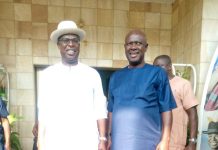The African Development Bank (AfDB) has urged the diversification of Nigeria’s export, revenue bases and trade facilitation capacity to boost revenue generation potential.
The AfDB President, Dr Akinwumi Adesina, said this at the second edition of the Nigeria Employers’ Summit on Monday in Abuja.
The News Agency of Nigeria (NAN) reports that the theme of the summit was, “Trade and Non-Oil: Changing the Narratives for Rapid National Development.”
The summit has as its theme, “Trade and Non-Oil: Changing the Narratives for Rapid National Development.
Adesina, represented by Mr Lamin Barrow, the Director-General, Nigeria Country Department of AfDB, said the measures would address some major risk faced by the country.
According to him, Nigeria like many other oil-exporting countries, faces several challenges related to global commodity price volatilities.
He said that the key challenge was the fiscal risks associated with overdependence on oil exports for fiscal revenues.
”Nigeria’s economy is one of the most diversified in Africa, with the oil sector accounting for less than 10 per cent of the Gross Domestic Product (GDP) with the non-oil sectors accounting for more than 90 per cent.
“The key challenge is revenue concentration.
”The oil sector accounts for 75 per cent of export revenues and 50 per cent of all government revenue, underscoring the vulnerability of the economy to oil-related shocks.
”This is aggravated by low trade volumes, particularly for manufactured exports, and underdeveloped agriculture value chains,” he said.
Adesina noted that Nigeria’s exports of goods and services as a percentage of the GDP, at 10.7 per cent, was the lowest among its middle-income peers in Africa.
He compared this to 31.2 per cent for South Africa, 44 per cent for Mauritius, 44.6 per cent for Botswana while Tunisia and Angola stood at 42.1per cent and 44.3 per cent, respectively.
Adesina said the limited non-oil exports had exposed the country to the vagaries of global oil markets with attendant adverse impacts on the fiscal space and constraining development spending.
He said while the share of manufacturing in Nigeria’s GDP had remained around seven per cent, the performance of the sector had deteriorated in the past five years.
”Nigeria’s manufacturing exports represent only three per cent of total revenues from exports, but accounts for 50 per cent of imports.
”Instead of being forward looking in expanding the share of manufactured goods export, Nigeria currently focuses on import substitution model.
”Instead of looking to create wealth through export market development and product diversification. Consequently, Nigeria remains a net food importer.
”Between 2010 and 2020, the annual food import bill averaged $6.4 billion while earning $1.2 billion annually, on average, from its food exports over the same period,” he explained.
Adesina said the revenue concentration was compounded by a poorly performing agricultural sector characterised by limited mechanisation, low productivity and underdeveloped value chains.
The AfDB boss listed macro-economic as a major bottleneck limiting full exploitation of the non-oil sectors of the economy.
He added that low productivity, inadequate access to credit for Small and Medium Enterprises, infrastructure and logistics deficiencies, especially inadequate power supply were the key challenges.(NAN)



























